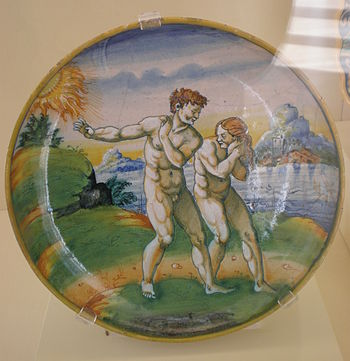
“See no evil, hear no evil, speak no evil” is not God’s way. We learn this from Genesis. We learn it as we observe naked Eve and Adam wandering about blissfully in God’s garden of Eden. In that self-same garden God placed the serpent, and allowed it not just to be seen but to be heard as it spoke its words of deception. God never warned Adam and Eve about the snake. Never told them not to associate with it. Never prepared them for the ideas the snake might present. Not a bit of “see no evil, hear no evil, speak no evil” in God’s garden.
God was quite willing to let the snake have its say: its beguiling promise that Adam and Eve could become god-like. God didn’t even offer a rebuttal. He let evil have its say without response.
Not surprising, therefore, that two innocents like our naked Eve and Adam fell head first for the serpents’s guile.
We call it guile, evil. But in fact the serpent did not lie.
“Did God say, ‘You shall not eat of any tree of the garden’?” he asked Eve.
“We may eat of the fruit of the trees of the garden,” she replied, “but God said, ‘You shall not eat of the fruit of the tree which is in the midst of the garden, neither shall you touch it, lest you die.’”
“You will not die,” replied the snake, truthfully.
Not only did Eve touch the tree without dying, she even plucked an apple. And ate it.
The serpent had more truth to shared with Eve, “God knows that when you eat of it your eyes will be opened, and you will be like God, knowing good and evil.”
And so it was.
But if our naked pair knew nothing of good and evil before eating the apple, how could either be expected to recognize evil in the snake’s simple statements? Like a fool, God left them unprepared for the serpent’s apparent honesty. At the one moment when his presence in the garden was most needed, God was absent.
Despite divine omniscience, he was unaware of the perfidy going on below.
“When the woman saw that the tree was good for food, and that it was a delight to the eyes, and that the tree was to be desired to make one wise, she took of its fruit and ate.”
Lacking as yet the ability to distinguish good from evil, Eve cannot be blamed for her mistake. Without a knowledge of good and evil, she could not be expected to recognize even the goodness of God.
The same for Adam, who we are told ate of the fruit only because his lovely and innocent wife offered it him. Genesis simply tells us, “she also gave some to her husband, and he ate.” No conversation between serpent and Adam reported here—not that it mattered. The man had no more ability to distinguish good from evil, truth from falsity, than the woman.
“Then the eyes of both were opened,” just as the snake had promised.
Suddenly the ability to know and recognize evil flooded their minds. We must ask, what evil did they thus so suddenly recognize? It was not the serpent. It was not the apple tree, nor its apples.
It was their nakedness.
Why, we must ask, were their naked bodies evil?
Why did God create and breathe life into two naked humans and declare them good—if in fact they were evil? Did he not want them to know?
Is that why he told them not to eat from the tree of knowledge of good and evil? To protect them from learning of his mistake?
Did God mess up, and try to hide it? Did the real perfidy come from God?
At the least, we must question his divine wisdom. For earlier we learned that “God planted a garden in Eden, in the east; and there he put the man that he had formed.” Yet God sabotaged his own plan by planting two inappropriate trees: “the tree of life also in the midst of the garden, and the tree of the knowledge of good and evil,”—we are explicitly told this in Genesis 2:9.
Why did God tempt fate? How reckless of him, to do so knowing the snake was about. Knowing as well the inability of the two naked creatures he created to distinguish good from evil, or know truth from falsehood.
God had only himself to blame for the consequences.
Two naked beings ate of the pleasant-seeming tree of knowledge and—just as the snake promised—their eyes were opened. They became like Gods, knowing good and evil.
They had eaten of one special tree, but don’t forget: there was another, the tree of life. They had not yet eaten of it, but surely it would not be long before they would do so. This thought raised God’s alarm like nothing else had.
“Then the Lord God said, ‘Behold, the man has become like one of us, knowing good and evil; and now, lest he put forth his hand and take also of the tree of life, and eat, and live forever—’”

God could not even finish the sentence. The idea was too alarming.
Immediately God drove Adam and Eve from the garden. But that was not enough—”and at the east of the garden of Eden he placed the cherubim , and a flaming sword which turned every way, to guard the way to the tree of life.”
The message in the story of Genesis is obvious. It goes like this—
God wanted us in the garden of Eden. We know it because he designed the garden for us and then put us there. Deliberately. We also know that despite recklessly planting the tree of knowledge and tree of life in the midst of the graden, God did not want us to eat of them. He did not want us to become like himself knowing good and evil. Nor did he want us to live forever.
Genesis is very clear about this.
And yet, there is one character in this story who encourages us to eat what is forbidden—the serpent, who tells us that if we do so we can become god-like, acquiring both knowledge and eternal life. Beguiled, we eat from one of the trees, and God becomes alarmed. Adamant that we should not have eternal life, God banishes us from the garden and sets a special guard to prevent us from living forever.
Perhaps after all God has our best interest at heart. Perhaps he does not. Either way, God is said to be our maker, and the story ends with his determination to prevent us from reaching eternity.
What about the serpent? We are not told the serpent’s opinion, but we do not need to be told. We know that if given the chance, the serpent would offer us fruit from the tree of life, just as he did with the tree of knowledge. We know that he would tell us its fruit is sweet, that if we eat our eyes will be opened once again, that we can become god-like and live forever. Eternity can be ours. We can join God!
In all the Old Testament, the serpent is the only one who promises us the heavens, who offers to us a God-like existence. Nowhere else in that book is any promise of eternity to be found.
For Christianity, this is a problem. Seeing it plainly laid out before us, the discontinuity of the New Testament with the Old becomes glaring.

Suddenly in the Gospels we see that the serpent has returned, that he has taken the form of Jesus.
Like the snake, Jesus offers us eternity.
Like the snake, Jesus says “eat of the tree of life.”
Eat, and so live forever.
The serpent has returned in the garb of a savior.







![Cover of "I Am Legend [Blu-ray]" Cover of "I Am Legend [Blu-ray]"](http://ecx.images-amazon.com/images/I/51mT1JZNjxL._SL350_.jpg)
